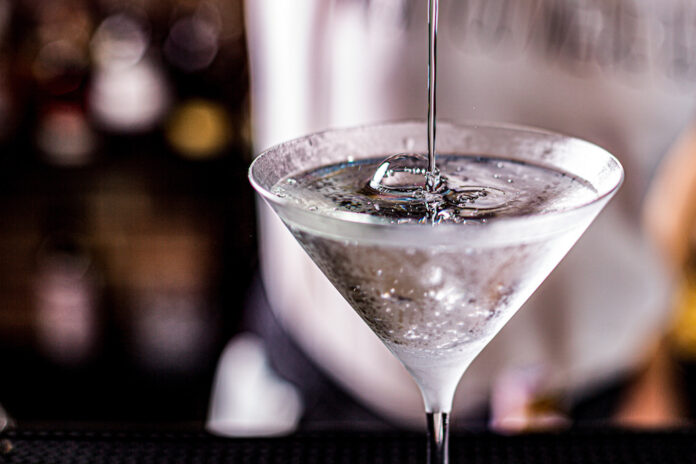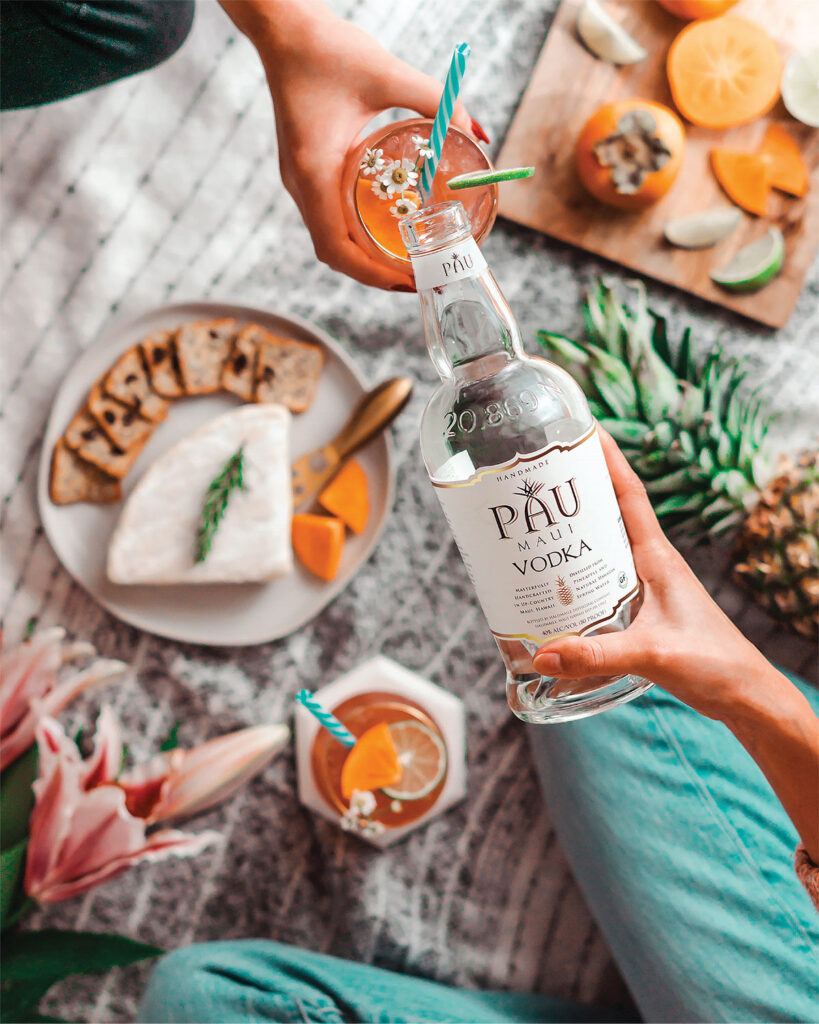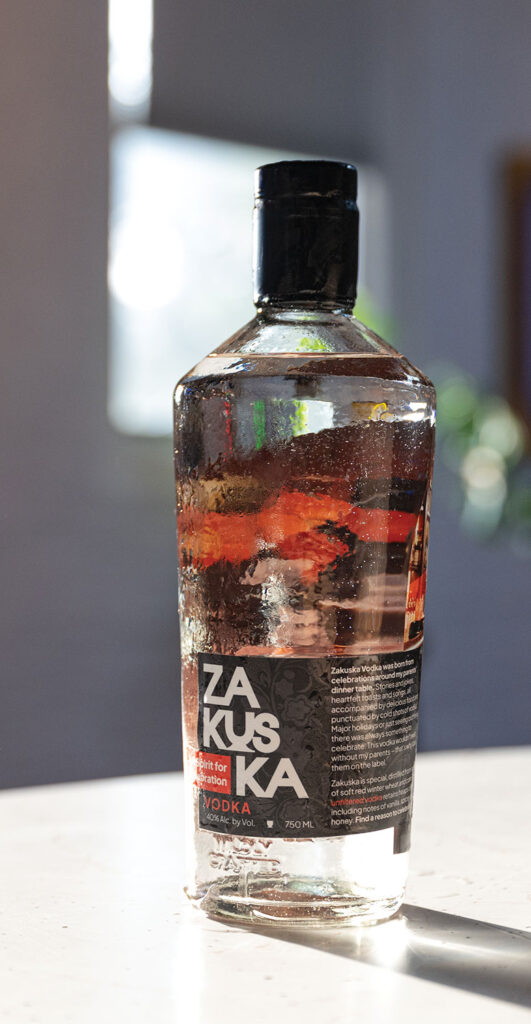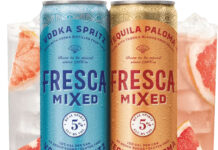Unlike tequila, bourbon or even gin, vodka has not generated too much buzz lately. But this spirit pays the bills at most bars and restaurants, given the amount of vodka that they sell and the favorable margins on many brands, and it tends to be a brisk seller for retailers.
Ready-to-drink (RTD) beverages have captured share recently, but vodka still commands a fair amount of the alcohol beverage sector, says Zachary Poelma, senior vice president of strategy & insights for the distributor Southern Glazer’s Wine & Spirits. “Vodka is about 25% of the total spirits category volume and will likely remain around that size, as we expect growth to remain about in line with total spirits growth when you exclude RTDs,” he says.
Vodka category volume fell about 4% for depletions from industry wholesalers looking at the on- and off-premise industry, says Poelma. But when you look at retailers and how their vodka business did, “third-party data sources like Nielsen put industry trends down about 1.5%,” he says.
“Retailer inventory destocking played a role in 2023 trends, where the consumer takeaway outpaced what distributors like SGWS were selling during this same time period,” Poelma continues. “This growth was really led by the premium price tier, which makes up almost half of the category, and was the primary price tier that grew within vodka in 2023.”
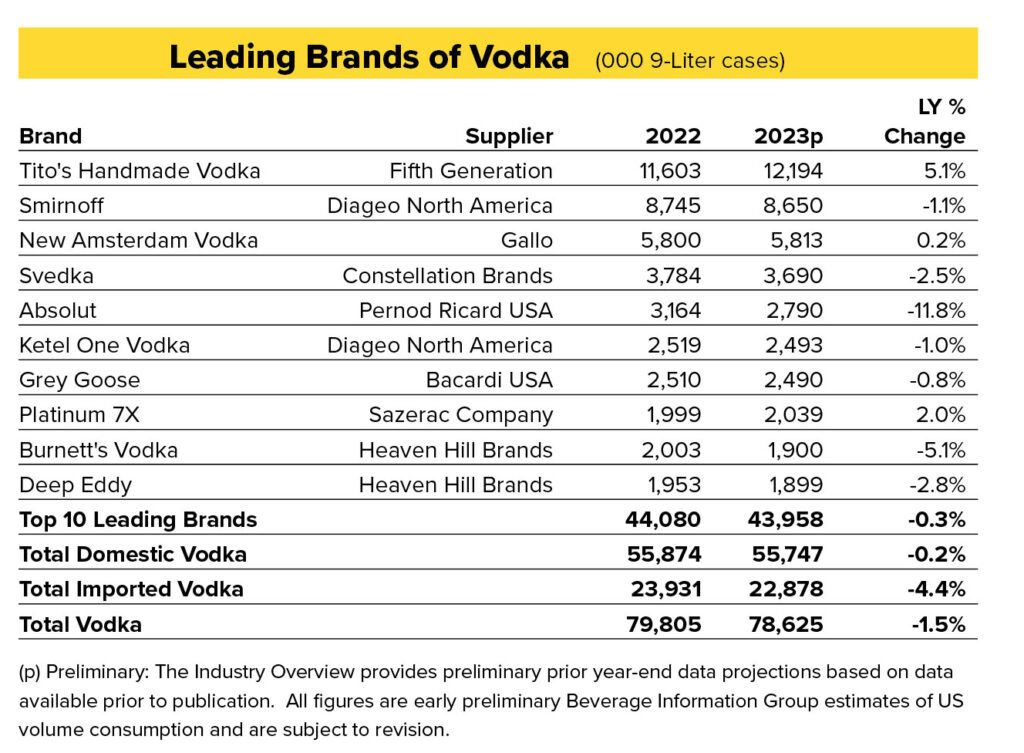
Playing with Unique Ingredients
Most vodka is made from fermented grains such as corn, wheat or rye, though other ingredients can be used. “I think you’ll see innovation in this space where brands continue to test new and different base opportunities that are different from some of the traditional bases used historically in vodka,” says Poelma.
For instance, Hali’imaile Distilling Co. makes its Pau Maui vodka from the Maui Gold pineapple, which the company says is ideal for fermentation because of its high sugar content, though the vodka has no distinct pineapple taste.
British vodka Pod, made from 100% peas, does have sweet vegetal pea notes, according to the company. New Zealand’s Broken Shed is distilled from whey.
Fierce & Kind makes its vodka with corn, which gives the spirit botanical notes due to the corn’s sweetness, says founder Basem Harb. “Whether you’re at a fine restaurant or working with some of the best mixologists, ingredients matter,” he notes. “It’s important to create a spirit that consumers would rather sip on than mix it with other ingredients.”
While many vodkas are filtered through charcoal to remove impurities and improve taste, Zakuska vodka is not filtered at all. Why not?
“When I started this brand, I reached out to 40 or 50 distillers across the U.S. and asked them to send me samples,” says Zakuska owner Arthur Revechki. “I taste-tested for about six months straight, and the one that stood out the most and actually had taste ended up being unfiltered,” he says.
“While there’s nothing wrong with filtering, what we’re able to get with our vodka is the mash that we use to distill it, namely red winter wheat and corn,” says Revechki. “When you don’t filter the vodka, you’re able to get some of the elements of that initial product you’re using. So we get notes of vanilla, caramel, fig and spice.”
Vodka Cocktails Rule
Vodka may have been largely on the sidelines of the craft cocktail movement but many consumers gravitate to the vodka-based drinks on a menu. Vodka and Soda (or vodka with any basic mixer) remains a top call for many bars, while drink trends such as the Dirty Shirley and the resurgence of the Cosmopolitan give the category a boost.
Perhaps no drink has done more for vodka recently than the Espresso Martini. Some industry watchers expected to drink’s popularity to fade a few years ago; instead, it’s stronger than ever. According to a survey conducted in January 2024 by Drive Research, 25% of people said they like to drink Espresso Martinis, a 79% increase from 2022.
Félix in Charleston, SC, serves hundreds of Espresso Martinis on any given Saturday night. The drink, priced at $16, uses almost exclusively locally sourced products, including Six & Twenty Cream liqueur and Hoodoo chicory liqueur.
Holy City’s “Dead Eye” espresso vodka, “adds that nice balancing touch to the bold espresso flavors,” says Félix’s beverage director Hailey Knight. The Félix is one of the “Félix Classics” cocktails; another is the American in Paris ($15), made with Cathead vodka, Byrrh, fresh grapefruit juice and tarragon.
The Up All Night cocktail at Silver Lining Lounge in New York, a take on the Espresso Martini that can also be served as a shot, combines Ketel One vodka, simple syrup, Borghetti espresso liqueur and cold brew. Two Fifteen, a bar and lounge in New York’s Public hotel, offers a classic version with vodka, real espresso and vanilla bean syrup.
Two Fifteen also offers a take on another vodka drink that’s been making a comeback: The Pornstar Martini. The bar’s Pornstar Julep, with vodka, Chinola passion fruit liqueur, vanilla, fresh lemon and Champagne, is served over crushed ice in a Julep cup. Beach Terrace Restaurant at Embassy Suites by Hilton Deerfield Beach Resort & Spa in Florida, has the Passionate Star, with vanilla vodka, passion fruit juice, vanilla syrup and a splash of prosecco.
LG’s Bar & Kitchen in Chicago introduced the Pornstar Martini to its lineup in 2022. The colorful drink, made with vanilla vodka, passion fruit liqueur, lime juice and passion fruit puree, is priced at $14; guests can add a split of prosecco for $6.
Not that vodka cocktails need to be sweet; savory classics include The Bloody Mary and the Dirty Martini. The trendy Caprese Martini at Jac’s On Bond in New York uses Grey Goose vodka, Lustau Blanco vermouth and balsamic vinegar, garnished with skewered cherry tomatoes.
Bartender Damien Emery just created The Herbalist cocktail for the bar and patio at Husk Charleston. An homage to celery inspired by the classic “ants on a log” snack, the drink combines paprika-infused vodka, Velvet Falernum, Genepy herbal liqueur, celery and lemon.
“I think Millennials are really driving a lot of the mixology and cocktail trends in the country,” says Harb with Fierce & Kind. “We’re hearing from bartenders that predominantly Millennials are ordering classic vodka drinks such as the Martini. It’s wonderful seeing younger people appreciating the quality of the minimalist, extraordinary cocktail.”
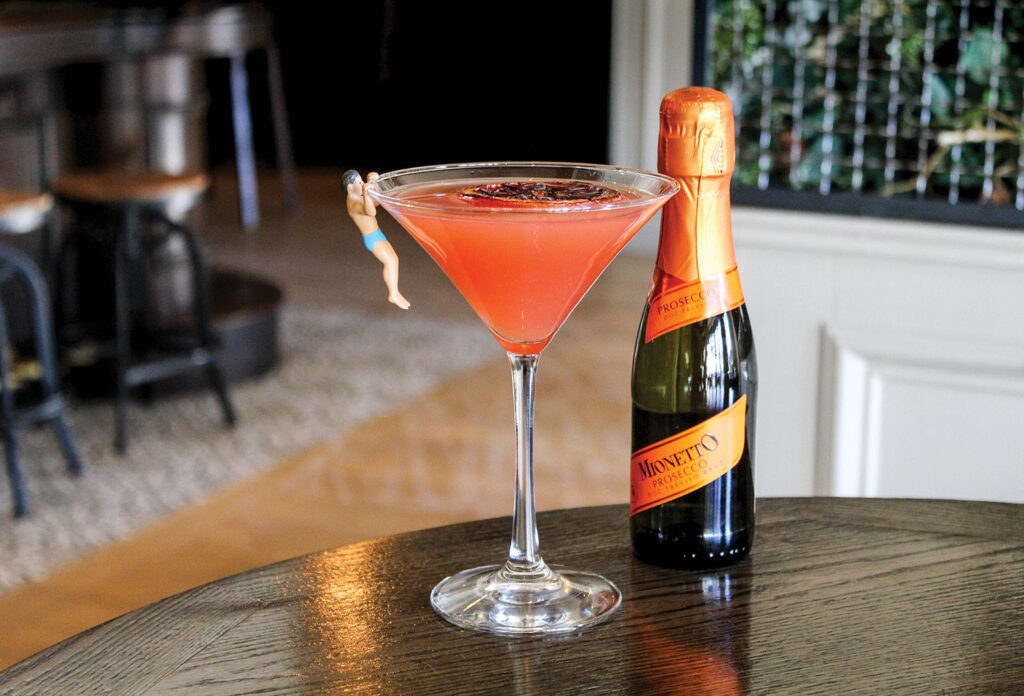
Premiumization vs. Price Sensitivity
The vodka category will likely continue to see modest premiumization over the next few years, “but we think most of the growth comes from trading up to premium price tiers from value tiers,” says Southern Glazer’s Poelma. Vodka also remains a category that is fairly price sensitive, he adds, which will drive what price segments a lot of the future innovation resides in.
While Wilbur’s Total Beverage in Fort Collins, CO, reports robust vodka sales, general manager Mat Dinsmore has been seeing consumers trade higher-priced vodka for cheaper options in the past 12 to 18 months. “Ketel One is doing quite well and Absolut is hitting a wall, but Tito’s is the only brand growing everybody else is off,” notes Dinsmore.
Indeed, category leader Tito’s is the only vodka in the top 10 to achieve significant growth; most brands in fact reported declines.
“We’re seeing a lot of vodka companies take things a little too far and price customers out of categories,” Dinsmore says. “Spirits are losing share nationwide right now, and some of these price increases are making people look at other options.”
The Future of Vodka
While Revechki expects vodka consumption to increase, he also hopes to see some of the smaller, more boutique brands take the spotlight over the next few years. “These smaller brands are able to be more creative and fluid and offer products that are more interesting,” Revechki says.
Harb also anticipates more of a resurgence of vodka in the coming years. “2024 may not be an important indicator of that, but we will see over the next half decade vodka reemerging as a consumer favorite, both at home and at their favorite restaurant,” he notes.
Justin Stiefel, CEO and co-founder of Heritage Distilling Co., which makes several flavored vodkas, also notes that customers are looking for vodka brands that they can connect with.
“There will emerge a sweet spot where the next major widely adopted vodka brand is great tasting, great for cocktails, has authentic roots and most importantly, has a clear and honest mission about supporting something more important to the broader community beyond just the brand itself,” he says.
“The next generation of vodka consumers are searching for the brand that will partner with them to help shape the kind of community they want to see,” Stiefel explains.
“But the key is to line up all the necessary attributes that very few brands can harness simultaneously: quality, price, value proposition, story and the team to grow it properly.”
Otherwise, Stiefel notes, “Does the world really need another vodka?”
Krystina Skibo is the Trade Managing Editor at Beverage Dynamics. Reach her at kskibo@epgacceleration.com. Read her recent pieces RTD Trends in 2024 and Brandy and Cognac: Welcoming a New Generation.

